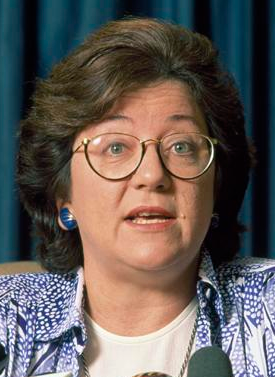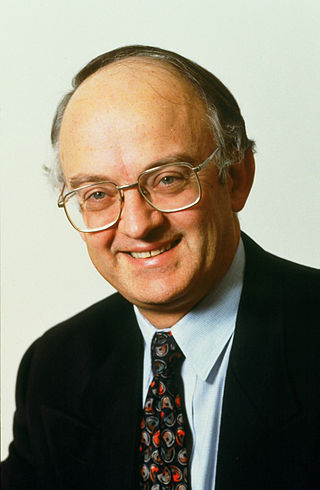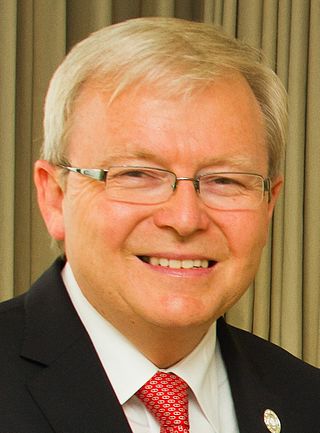
Simon Findlay Crean is an Australian politician and trade unionist. He was the Member of Parliament for Hotham from 1990 to 2013, representing the Labor Party, and served as a Cabinet Minister in the Hawke, Keating, Rudd and Gillard governments. He was the Leader of the Labor Party and Leader of the Opposition from November 2001 to December 2003.

Kim Christian Beazley is an Australian former politician and diplomat. He was leader of the Australian Labor Party (ALP) and leader of the opposition from 1996 to 2001 and 2005 to 2006, having previously been a cabinet minister in the Hawke and Keating governments. After leaving parliament he served as ambassador to the United States from 2010 to 2016 and governor of Western Australia from 2018 to 2022.

Francis Daniel Crean was an Australian politician who served as a member of the House of Representatives from 1951 to 1977, representing the Labor Party. He was a minister in the Whitlam government, including as Treasurer from 1972 to 1974 and Deputy Prime Minister for a few months in 1975.

Carmen Mary Lawrence is an Australian academic and former politician who was the Premier of Western Australia from 1990 to 1993, the first woman to become the premier of an Australian state. A member of the Labor Party, she later entered federal politics as a member of the House of Representatives from 1994 to 2007, and served as a minister in the Keating government.

Jennifer Louise Macklin is an Australian former politician. She was elected to federal parliament at the 1996 federal election and served as the deputy leader of the Australian Labor Party (ALP) from 2001 to 2006, under opposition leaders Simon Crean, Mark Latham and Kim Beazley. After the ALP won government at the 2007 election, she held ministerial office under Kevin Rudd and Julia Gillard, serving as Minister for Families, Community Services and Indigenous Affairs (2007–2013) and Minister for Disability Reform (2011–2013). She retired from parliament at the 2019 election.

Lindsay James Tanner is a former Australian politician. A member of the Australian Labor Party (ALP), he represented the seat of Melbourne in the House of Representatives from 1993 to 2010 and served as Minister for Finance in the Rudd and Gillard governments from 2007 to 2010.

Robert Francis McMullan is an Australian former politician who represented the Australian Labor Party in both the Senate and the House of Representatives. He was the first person to represent the Australian Capital Territory in both houses of federal parliament

Stephen Francis Smith is the current High Commissioner of Australia to the United Kingdom and formerly an Australian politician who was a member of the House of Representatives for Perth from 1993 to 2013, representing the Australian Labor Party. He served as a minister in the Rudd and Gillard governments, including as Minister for Foreign Affairs (2007–2010), Minister for Trade (2010), and Minister for Defence (2010–2013).

Wayne Maxwell Swan, often colloquially referred to as Swanny, is an Australian politician serving as the 25th and current National President of the Labor Party since 2018, previously serving as the 14th Deputy Prime Minister of Australia and Deputy Leader of the Labor Party from 2010 to 2013, and the Treasurer of Australia from 2007 to 2013.

The Division of Jagajaga is an Australian Electoral Division in the state of Victoria. It is located in the north-eastern suburbs of Melbourne, and lies north of the Yarra River. It covers an area of approximately 104 square kilometres and comprises the suburbs of Bellfield, Briar Hill, Diamond Creek, Eaglemont, Greensborough, Heidelberg, Heidelberg Heights, Heidelberg West, Ivanhoe, Ivanhoe East, Lower Plenty, Montmorency, Plenty, Rosanna, St Helena, Viewbank, Yallambie, Watsonia and Watsonia North; and parts of Bundoora, Eltham, Eltham North, Hurstbridge, Macleod, Wattle Glen and Yarrambat.
The Shadow Ministry of Kim Beazley was the opposition Australian Labor Party shadow ministry of Australia from January 2005 to December 2006, opposing John Howard's Coalition ministry.
The Shadow Ministry of Mark Latham was the opposition Australian Labor Party shadow ministry of Australia from December 2003 to January 2005, opposing John Howard's Coalition ministry.
The Shadow Ministry of Kevin Rudd was the opposition Australian Labor Party shadow ministry of Australia from December 2006 to December 2007, opposing John Howard's Coalition ministry.

A leadership spill of the Australian Labor Party (ALP) was held on 4 December 2006. Opposition Leader Kim Beazley was challenged by Shadow Foreign Minister Kevin Rudd, while Deputy Opposition Leader Jenny Macklin was challenged by Shadow Health Minister Julia Gillard in a joint-ticket. Rudd defeated Beazley, after which Macklin resigned, leaving Gillard to become Deputy Leader unopposed.

A leadership spill of the Australian Labor Party (ALP), the official opposition party in the Parliament of Australia, was held on 28 January 2005. The outgoing Opposition Leader, Mark Latham, stood down 13 months after assuming the leadership in December 2003. Kim Beazley was the only contender for the ballot, and was therefore elected unopposed.
Two leadership spills of the Australian Labor Party (ALP), the official opposition party in the Parliament of Australia, were held on 16 June 2003 and 2 December 2003, respectively. The Opposition Leader, Simon Crean, won the ballot in June against former opposition leader Kim Beazley, but resigned as leader in late November after losing support from his colleagues and did not contest the December ballot which Mark Latham won against Kim Beazley.

The second Rudd government was the federal executive Government of Australia led by Prime Minister Kevin Rudd of the Australian Labor Party. It commenced on 27 June 2013 and ceased on 18 September 2013. Rudd had previously served a term as Prime Minister from 2007 to 2010 and been replaced by his deputy Julia Gillard, following an internal party spill. Rudd regained the Labor Party leadership by successfully re-challenging Gillard in a June 2013 party spill. On 5 August, Rudd called an election for 7 September 2013, which resulted in the defeat of his government by the Liberal/National Coalition led by Opposition Leader Tony Abbott.

A leadership election was held in October 2013 to select Kevin Rudd's replacement as leader of the Australian Labor Party and Leader of the Opposition. Bill Shorten was elected party leader, and Tanya Plibersek was later confirmed as deputy leader.

The Australian Labor Party held a leadership election on 19 March 1996, following the resignation of Paul Keating after the party's defeat at the 1996 federal election. Kim Beazley was elected unopposed as Keating's replacement, thus becoming Leader of the Opposition.
The Shadow Ministry of Kim Beazley was the opposition Australian Labor Party shadow ministry of Australia from 19 March 1996 to November 2001, opposing John Howard's Coalition ministry.














